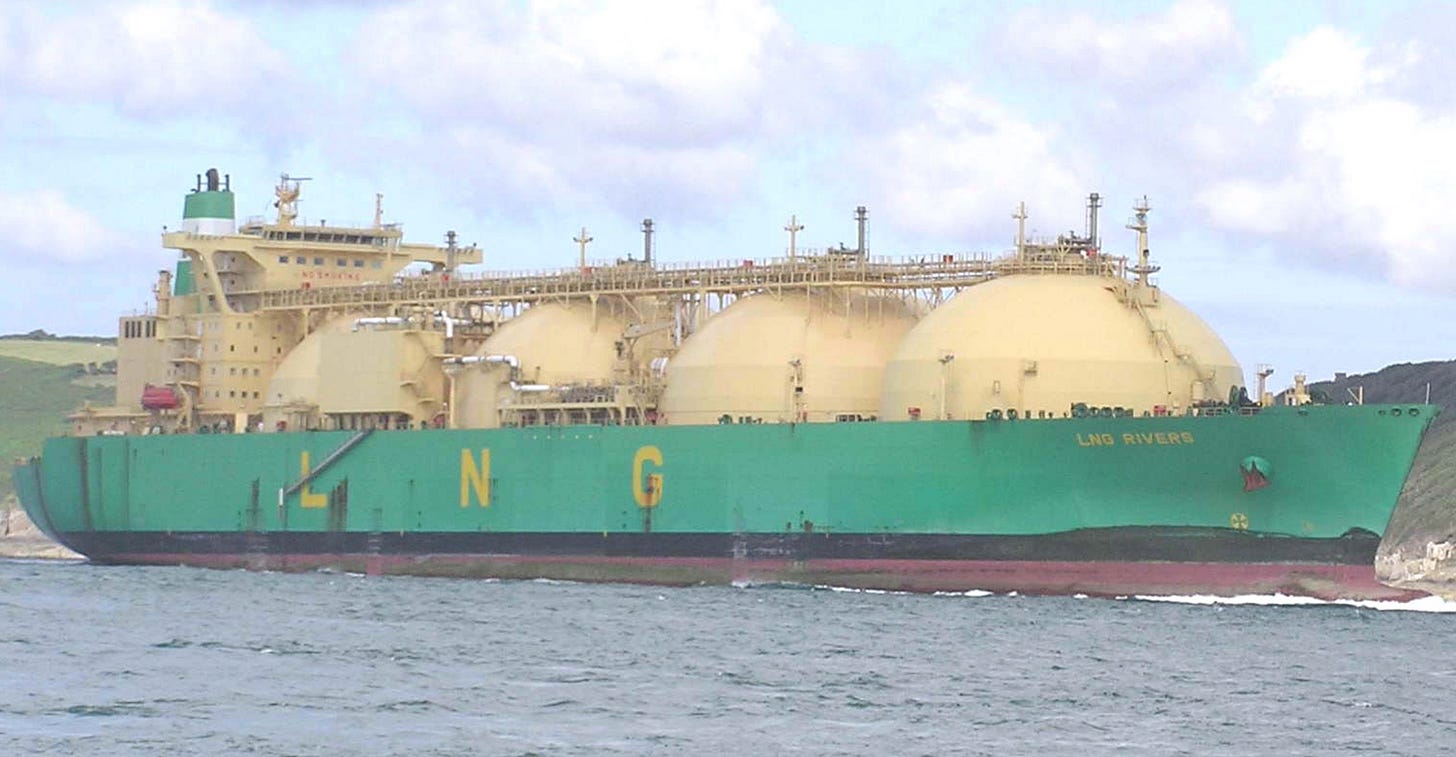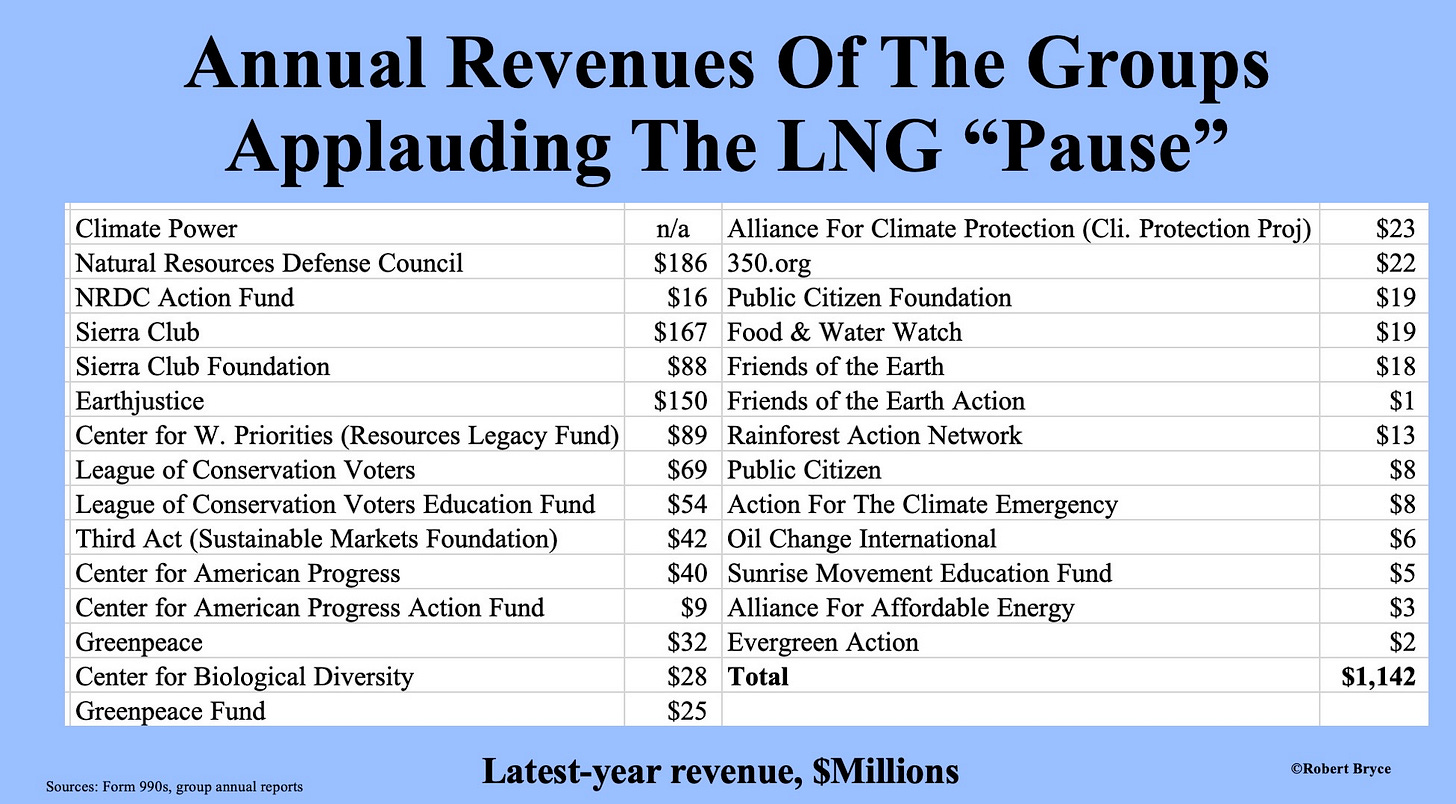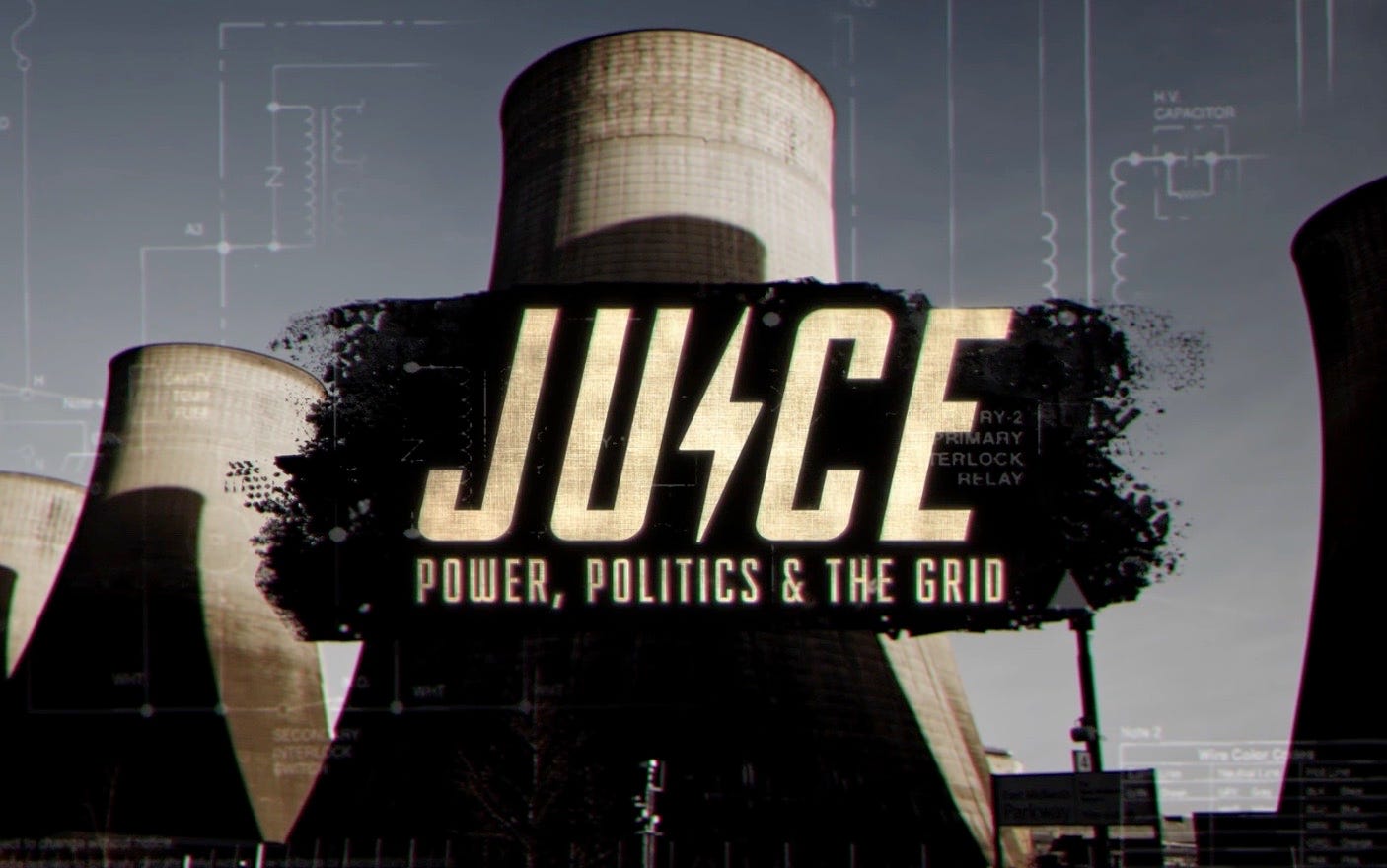Dialing For Anti-LNG Dollars
The NGOs behind Biden’s LNG “pause” have annual budgets totaling $1.14 billion, including tens of millions of dollars per year in dark money.

Since late January, when the Biden Administration announced it was implementing a “temporary pause” on permits for LNG exports, there has been an enormous amount of speculation about the reasons behind the decision. It was also widely criticized. One of my favorite critiques came from my pal and everyone’s favorite poulet-pundit, Doomberg, who called the LNG pause “a deeply contemptuous maneuver.”
According to press reports, the decision to stop the LNG approvals was made by Biden climate advisor John Podesta, who has been a fixture in Democratic politics and fundraising for decades. Podesta was chief of staff during Bill Clinton’s stint in the White House. He went on to manage Hillary Clinton’s unsuccessful presidential campaign in 2016. He also founded the Center for American Progress (annual budget: $40 million), one of the many groups that cheered Biden’s anti-LNG move. Thus, the easiest way to understand why Biden decided to halt LNG permits is to follow the money.
Put short, Podesta’s move is simply a gift to the anti-industry industry and the megadonors who are funding it. As I reported in these pages on February 18, 2023, that industry pulls in some $4.5 billion per year to push its anti-hydrocarbon, anti-nuclear agenda. The anti-industry industry is supported by a group of billionaires whom Biden will need to help fund his re-election campaign. Indeed, the groups who cheered the LNG pause have combined annual budgets exceeding $1.1 billion. Before I jump into the details on the money, some context is needed.
That context includes Europe’s energy security, the lack of scientific justification for Biden’s move, and why this “pause” is a gift to other LNG exporters.
Right before the ban was announced, the German gas industry made it clear that it would need the fuel, saying, “Additional volumes of US LNG are crucial for European energy security, particularly in the face of potential future supply shortfalls due to geopolitical instability and reduced domestic production.”
Climate activists claim that restricting LNG exports is needed to reduce greenhouse gas emissions and that exporting U.S. LNG is worse than using coal. That claim isn’t backed up by the facts. As Roger Pielke Jr. noted on his Substack on January 29, “suggesting that LNG is worse than coal in terms of greenhouse gas emissions,” which is the claim being made by Robert Howarth of Cornell University, “is both contrary to a broad scientific consensus on this issue and a lone outlier.” Pielke points out that the Department of Energy “has concluded that U.S. LNG exports to Europe” have fewer emissions “than coal or even LNG exports from elsewhere.” Pielke was referring to a 2019 report by the National Energy Technology Laboratory, which found that:
The use of U.S. LNG exports for power production in European and Asian markets will not increase GHG emissions from a life cycle perspective, when compared to regional coal extraction and consumption for power production. The results show that for all 100-year time horizon scenarios the generation of power from natural gas has lower life cycle GHG emissions than power generation from regional coal. (Emphasis added)
Other LNG exporters have seized on the Biden administration’s move. Earlier this week, Qatar announced a major expansion of its LNG export capacity. As Politico explained on February 26, “The nation which vies with the U.S. and Australia as the biggest shipper of the fuel, will develop a new 16 million metric tons a year project before the end of this decade, lifting annual production capacity to 142 million metric tons by 2030...The expansion opens the way for the Middle East country to secure a dominant long term role in global exports.”
In a February 25 piece on the Qatari LNG expansion, Reuters cited a recent report from analysts at Goldman Sachs, who are predicting a "bearish cycle" in global LNG markets in the second half of this decade. The article continued, noting that “Qatar benefits from the expansion announcement since it is a low-cost LNG supplier and it adds to the image of Qatar as a dependable supplier, especially after the U.S. pause was announced.”
In other words, the Biden administration’s pause diminishes America’s standing in the global LNG marketplace because buyers see that projects can be stopped solely for political reasons. And rival suppliers are eagerly stepping in to fill the potential gap left in the market.
Now, let’s look at the money. In a February 22 piece in the Washington Examiner, reporter Gabe Kaminsky explained that billionaire Michael Moritz controls a nonprofit that has “wired millions of dollars to prop up climate initiatives” that include a network of dark money outfits, including New Venture Fund and Resources Legacy Fund. Kaminsky reported that “Moritz’s San Francisco-based Crankstart Foundation boosted the controversial climate initiative, known as the Funder Collaborative on Oil and Gas, is an inside look at how wealthy Democrats poured cash into environmental activist hubs that lobbied to choke off new permit approvals for LNG.”
That analysis is helpful. But there’s an easier way to track the anti-industry industry and the vast amounts of money it is spending to hamstring the use of domestic hydrocarbons, including the export of LNG. Here’s what I did: I looked up the groups quoted in the January 27 press release by the White House about the LNG permit freeze and tallied up their annual budgets. I got the numbers by looking at their websites and their Form 990s, which are available in ProPublica’s Nonprofit Explorer. What did I find? Those groups have total annual budgets of some $1.14 billion.
The groups quoted in the press release “What They Are Saying: Leaders Praise Biden-Harris Administration Pause on Pending Decisions of Liquified Natural Gas Exports” include familiar names like the Natural Resources Defense Council and numerous other groups. The release includes a quote from Abigail Dillen, the president of Earthjustice, which is based in San Francisco. “We applaud the Biden administration for taking this tremendously important step to align its decision-making on gas exports with U.S. climate goals,” Dillen said. “As communities across the country face the devastating impacts of the climate crisis and fossil fuel pollution, it’s never been clearer that rubber-stamping LNG exports is not in the public interest.”
Earthjustice, formerly the Sierra Club Legal Defense Fund, had $151 million in revenue in 2023 and employs more than 200 lawyers. The group provides an example of the staggering amounts of dark money behind the anti-industry industry. Its latest Form 990 includes a Schedule B (for contributors) with numerous blank entries. Its annual report doesn’t list any of its donors. The group says its goal is to “secure a swift and equitable transition to 100% clean energy.” It also aims to electrify everything and stop “fossil fuel expansion.” (I’ll be writing more about Earthjustice soon.)
The anti-industry industry’s media echo chamber was illustrated in the White House press release. It quotes Lori Lodes, the executive director of Climate Power. Lodes claims Biden has “done more to protect our planet and build a booming clean energy economy that ends our reliance on dirty fossil fuels than any other president in history.” She went on to claim the LNG pause is a “historic move” to “address the global threat of a very real climate crisis.”
What is Climate Power? It’s not a non-profit. It doesn’t disclose its budget. Instead, it’s an “an independent strategic communications and paid media operation” funded by the Center for American Progress Action Fund, League of Conservation Voters, and the Sierra Club. Recall that the White House press release refers to the people quoted as “leaders.” But Lodes isn’t a leader, she’s a media flack whose job is to echo the messaging of the climate NGOs.
Speaking of the Center for American Progress, it, too, got a shoutout in the White House’s January 27 press release. It cited a January 26 tweet from Podesta’s group, which said, “Good News Friday: The Biden administration is taking our environmental concerns SERIOUSLY.” That’s true: Biden and Podesta are taking the billionaires and their many minions in the anti-industry industry seriously.
In addition, the LNG pause is a clear win for Biden’s campaign funding effort, a win for Qatar’s LNG business, and loss for energy security in Europe.
Docuseries Screening Monday Night In Austin
We will be screening three episodes from our docuseries, Juice: Power, Politics & The Grid, in Austin on Monday, March 4, at AFS Cinema. Screening starts promptly at 6:30p. The event is free but seating is limited. If you want to attend, please email: hello.robertbryce (at) gmail.com
What I’m Reading
“Green Guardrails: Guiding New York’s Drive To Lower Emissions,” is a terrific new report by the Empire Center’s Ken Girardin on the stratospheric cost of New York’s Climate Act. Ken is dogged researcher and one of New York’s best energy analysts. The punchline: the state, under the disgraced former governor Andrew Cuomo, tried to hide the costs, but as currently configured, the Climate Act could cost New York residents a staggering $4.9 trillion by 2050.
“How To Entrench Decline,” is another terrific essay by one of my favorite writers, Emmet Penney. Emmet focuses on the lawsuit Chicago recently filed against the oil industry for “climate deception.” My favorite section: “This lawsuit reveals climatism’s ultimate political logic: scapegoating and lawfare to avoid the difficult work of building and stewarding infrastructure. It’s a self-exculpatory justification for decline via the moral license of environmentalism.”
Please click that ♡ button
We’ve had over 500,000 views of our new five-part docuseries, Juice: Power, Politics & The Grid! Please watch it and share it: JuiceTheSeries.com






Excellent article. The climate cartel has been allowed to control the narrative to the point that everyone, even those who oppose their agenda, use their terminology when discussing energy. Terms such as greenhouse gas emissions and carbon footprint are their creations which when used reinforce the false notion that people cause climate change.
“Major Strasser has been shot, round up the usual suspects!” Nothing has changed. The Laszlo’s escape, Rick and Louis have a future in Casablanca. John Podesta, The Sierra Club, billionaires with huge guilt complex’s that got lucky with an advanced abacus and want to take us all back to Happy Days, the Fonz, Richie Cunningham, real Coke! Or more darkly and likely, they want to punish those that disagree, those that smell, see and taste their grift. Eat bugs little people we have grass fed beef. None of them know how a kilowatt is generated, transmitted and distributed, they don’t care, the cause is more important. It is hard to look at the major LNG infrastructure projects just in Texas alone with investors like Goldman Sachs and KKR and not believe the current freeze is anything but political punishment. As soon as the election is over and the base in Washington restored to its natural order the big money will talk again, the money will flow and the gas will go where the market wants and needs it.
WC Fields and a country bumpkin playing poker…”Mr. Fields is this a game of chance?” “No my friend, not the way I play no…”